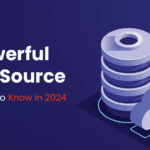Why and How to Migrate from Oracle to PostgreSQL: This blog explores the key considerations when migrating from Oracle to PostgreSQL, including cost savings, scalability, and performance benefits. Learn about the step-by-step migration process, from data transfer to post-migration support. We will also discuss the advantages of PostgreSQL, such as lower costs and enhanced performance, as well as potential challenges like data compatibility. Lastly, discover how Simple Logic IT can help ensure a seamless migration to PostgreSQL.
Key Takeaways:
- What are Oracle and PostgreSQL? Both are powerful relational database management systems (RDBMS), but they differ in licensing, features, and scalability.
- Why should you migrate from Oracle to PostgreSQL? Cost savings, open-source flexibility, and performance optimization are some of the top reasons.
- How to migrate from Oracle to PostgreSQL? Learn about the step-by-step process of migration and the tools involved.
- Migration Benefits & Advantages: Reducing licensing costs, enhancing scalability, and leveraging a vibrant community.
- Potential Challenges: Data mapping issues, compatibility concerns, and expertise requirements.
If you are looking to modernise your data architecture and reduce overheads, migrating from Oracle to PostgreSQL could be the strategic decision you need. This blog explains why and how to migrate from Oracle to PostgreSQL, how it can benefit your business, and how Simple Logic IT can assist you with seamless migration services.

1. What are Oracle and PostgreSQL?
Oracle is a widely-used, proprietary relational database management system developed by Oracle Corporation. It is known for its robustness, security features, and extensive support for complex data structures. Oracle is popular among large enterprises, especially in industries like finance, healthcare, and telecommunications. However, it comes with a significant cost due to licensing fees and requires substantial hardware and operational resources to maintain.
On the other hand, PostgreSQL is an open-source relational database management system that emphasises extensibility, standards compliance, and support for advanced data types. PostgreSQL is known for its performance, ease of use, and flexibility, which has made it a favourite among developers and businesses looking to avoid the high costs associated with proprietary systems like Oracle.
2. Why Migrate from Oracle to PostgreSQL?
- Cost Considerations
One of the most compelling reasons why companies decide to migrate from Oracle to PostgreSQL is cost savings. Oracle’s licensing fees, hardware costs, and ongoing support can be a significant burden on businesses. In contrast, PostgreSQL is open-source and free to use, significantly reducing operational costs. Additionally, PostgreSQL’s flexible architecture can help organisations lower infrastructure and maintenance costs.
- Open Source Advantages
Being open-source, PostgreSQL offers businesses more control over the database system. With Oracle, you’re often tied to the vendor for updates, patches, and new features. PostgreSQL, however, is continuously updated by a large community of developers and contributors. This openness means you can adapt the system to your specific needs without paying for proprietary add-ons.
- Flexibility & Customization
PostgreSQL allows businesses to customize their database environments. With its support for custom functions, types, and indexing methods, PostgreSQL provides a level of flexibility that is unmatched by Oracle. Moreover, its compatibility with various programming languages and frameworks ensures seamless integration with other systems.
3. How to Migrate from Oracle to PostgreSQL?
Migrating from Oracle to PostgreSQL can seem like a daunting task, but with proper planning and the right tools, the transition can be smooth and efficient.
Pre-Migration Preparation
The first step in the migration process is assessing your current Oracle environment. This includes understanding the structure of your Oracle database, the dependencies between applications, and any special configurations or custom features you’ve implemented. Once the assessment is complete, you should evaluate PostgreSQL’s capabilities to ensure it can meet your specific needs.
You also need to decide on a migration strategy. There are generally two approaches:
- Full Migration: Transfer all Oracle data and configurations to PostgreSQL.
- Phased Migration: Move certain tables or applications first, followed by the full migration over time.
Migration Process
The actual migration process involves the following steps:
- Data Migration: Tools like Ora2Pg or PGLoader can automate the process of migrating data from Oracle to PostgreSQL. These tools will help with schema conversion, data mapping, and data insertion into PostgreSQL.
- Schema Conversion: Since Oracle and PostgreSQL have different syntax and data types, schema conversion tools like AWS Schema Conversion Tool (SCT) or SQLines can be used to convert Oracle database structures to PostgreSQL-compatible formats.
- Application Compatibility: Modify any Oracle-dependent application code to ensure compatibility with PostgreSQL. This may include SQL query changes, stored procedures, and function adaptations.
- Testing: After migrating the data and code, extensive testing should be carried out to ensure the new PostgreSQL database functions as expected.
Post-Migration Support
Once the migration is complete, you will need ongoing maintenance and support to address any performance issues, fine-tune queries, and resolve bugs. PostgreSQL offers a vibrant community and professional support options, but having experts like Simple Logic IT to guide you post-migration ensures the system is optimised for your business needs.
4. Benefits and Advantages of Migrating from Oracle to PostgreSQL
- Cost Savings
As mentioned earlier, one of the top reasons to migrate is the significant cost savings. PostgreSQL eliminates the need for costly licensing and reduces hardware costs, making it a more affordable option for companies of all sizes.
- Scalability
PostgreSQL provides exceptional scalability. It can handle both small and large workloads efficiently, making it suitable for businesses that need to grow. As your data volume increases, PostgreSQL scales seamlessly without compromising performance.
- Performance Optimization
With built-in features like parallel query processing, partitioning, and query optimization, PostgreSQL offers better performance and resource management than Oracle in many cases. PostgreSQL also supports advanced indexing techniques, such as GiST and GIN indexes, which can significantly improve query performance.
- Strong Community Support
PostgreSQL has an active and supportive community of developers and users. This community regularly contributes to the database’s development, ensuring it stays up to date with the latest features, security patches, and performance improvements.

Migrating from Oracle to PostgreSQL comes with a few challenges, including:
- Data Compatibility
Oracle and PostgreSQL differ in data types and structures, leading to data compatibility issues. For instance, Oracle’s PL/SQL stored procedures cannot be directly transferred and will require rewriting in PostgreSQL-compatible syntax. This may need conversion tools and manual intervention to avoid errors.
- Learning Curve
Oracle teams may face a learning curve when transitioning to PostgreSQL, as its syntax, structure, and optimization strategies differ. Training and documentation can help teams adapt, but this can temporarily slow productivity.
- Handling Large Datasets
Migrating large databases often requires significant downtime, affecting business operations. Minimising downtime and ensuring data integrity during migration is crucial for a smooth transition.
Performance tuning settings in Oracle don’t always apply to PostgreSQL, so adjustments will be needed for optimal performance. Expertise in PostgreSQL is required to maintain efficiency post-migration.
- Staff Training
As PostgreSQL’s structure and syntax differ from Oracle, staff training is necessary to ensure the team can effectively manage and maintain the new system, which could impact productivity initially.
6. Use Cases for Oracle to PostgreSQL Migration
Here are a few examples of when migrating from Oracle to PostgreSQL makes sense:
- Small to Medium Businesses: Businesses looking to cut costs without compromising on database functionality can benefit from PostgreSQL’s low-cost, open-source nature.
- Cloud-Native Companies: Businesses transitioning to cloud-based infrastructure can use PostgreSQL’s flexible, scalable nature to optimise cloud database performance.
- Startups: New companies seeking cost-effective and highly scalable database solutions without the upfront licensing costs of Oracle.
7.Best Tools for Oracle to PostgreSQL Migration
Several tools simplify the migration process, offering compatibility features, automation, and ease of use:
- Ora2Pg: This open-source tool automates schema conversion, data extraction, and loading processes, reducing migration time.
- AWS Database Migration Service: A reliable choice for cloud-based migrations, providing minimal downtime during the migration process.
- pgAdmin: An essential tool for PostgreSQL management that includes features for schema creation, data migration, and performance monitoring.
- DBConvert: Supports database conversion and synchronisation between Oracle and PostgreSQL, ideal for businesses needing complex migration features.
8. Why Simple Logic IT is the Best Choice for Your Migration
At Simple Logic IT, we understand the complexities involved in migrating from Oracle to PostgreSQL. Our team of database migration experts offers:
- Seamless migration services that ensure minimal downtime and data loss.
- Customised solutions to meet the specific needs of your business, whether you’re migrating an entire database or just certain elements.
- Expert post-migration support to ensure your new PostgreSQL system runs smoothly and efficiently.
- Cost-effective pricing that saves you money in both the short and long term.
Wrapping Up for Why and How to Migrate from Oracle to PostgreSQL
Migrating from Oracle to PostgreSQL can seem challenging, but with the right expertise and planning, the benefits far outweigh the drawbacks. Whether you’re looking for cost savings, better performance, or more flexibility, PostgreSQL provides a powerful solution for modern businesses.
If you are ready to take the next step toward migration, Simple Logic IT is here to guide you through the entire process. We offer end-to-end migration services, ensuring your business enjoys a smooth transition from Oracle to PostgreSQL.
FAQs on Why and How to Migrate from Oracle to PostgreSQL
What are the main benefits of migrating from Oracle to PostgreSQL?
- Migrating to PostgreSQL offers cost savings, scalability, and strong community support.
What challenges might I face during the migration process?
- Challenges include data compatibility issues, a learning curve for teams, and performance tuning adjustments.
How do Oracle and PostgreSQL handle empty strings and NULL values differently?
- Oracle treats empty strings as NULL, whereas PostgreSQL distinguishes between the two.
What tools can assist in migrating from Oracle to PostgreSQL?
- Tools like AWS Schema Conversion Tool (SCT) and Database Migration Service (DMS) facilitate schema and data migration.
How should I handle Oracle-specific functions not supported in PostgreSQL?
- Review and modify code to replace Oracle-specific features with standard SQL or PostgreSQL-compatible functions.




